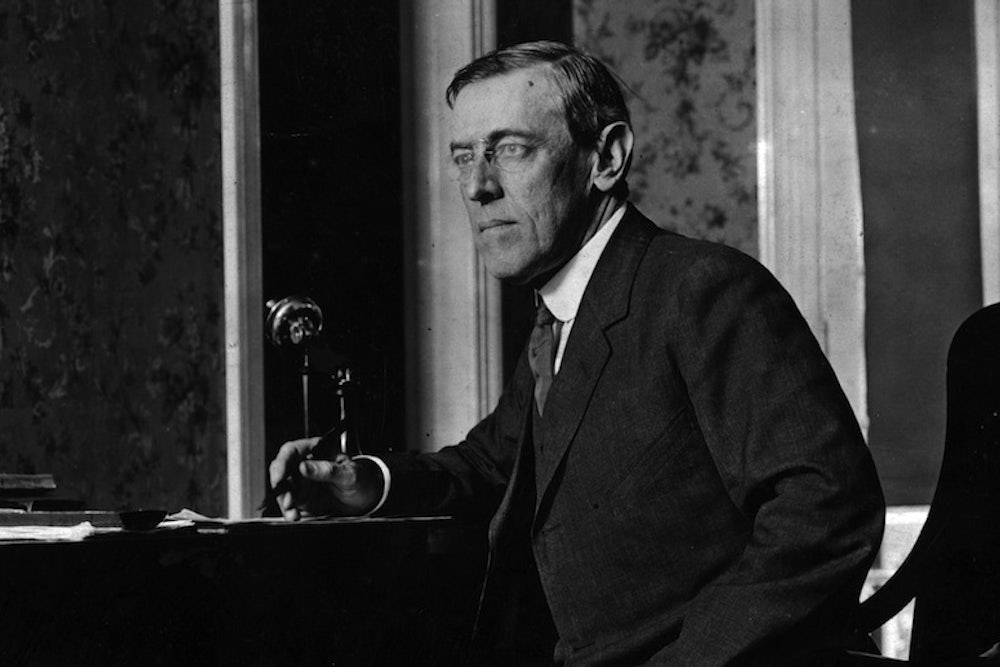This is the third entry in a debate between Michael Kazin and John M. Cooper over the United States' entry into World War I, which began one hundred years ago this month. Kazin teaches history at Georgetown University and is writing a book about American opponents of World War I. Cooper is the author of Woodrow Wilson: A Biography.
Read Part 1 of their debate; Part 2 here.
John Milton Cooper, Jr. has enormous faith in what Woodrow Wilson might have accomplished if World War I had lasted longer. He believes Wilson could have dictated a more just and lasting settlement at the Versailles conference; that he would have relaxed the chilling and prosecution of dissent at home; and that he could have persuaded the Senate to allow the U.S to join the League of Nations, if only a stroke hadn’t terminated his oratorical powers.
As the greatest living biographer of the 28th president, Cooper can be excused for thinking so well of the man. But his counterfactuals minimize the impact of what Wilson had already done and fail to take the desires and political needs of the Allied powers into account.
On Flag Day in 1917, before any doughboys had yet arrived in France, Wilson essentially equated opposition to the war with treason. That conviction propelled his administration to enforce the most repressive regime in the nation’s history. Hundreds of newspapers were banned from the mail, some 4,000 Americans were indicted for speaking or writing critically about the war, and hundreds of young pacifists were jailed for refusing to serve in the military. Some of the latter underwent torture. It seems far more likely that such policies would have persisted during a longer war, in which more U.S. soldiers died, than that the president would have seen fit to abandon them—admitting, in effect, that he had mistaken dissent for disloyalty.
And why would the leaders of Great Britain and France have mitigated their demands if the U.S. Army had done more to win a war that extended into 1919 and, perhaps, beyond? The pressure on Lloyd George and Georges Clemenceau to justify the sacrifice of even more of their countrymen would have been greater, as would their determination to preserve and enlarge their empires. Ironically, Wilson might have had greater sway over the peace settlement if he had taken the U.S. into the war much earlier—perhaps right after a German U-Boat sank the Lusitania in May 1915. But only a small minority of Americans then favored such a move, and Congress would probably have rejected it.
For that matter, Cooper’s belief in the diplomatic prowess of the U.S. military is as great as his faith in Wilson. But his contrast with the next global conflict leaves out a crucial fact about how “the long march toward the end of colonialism” advanced. American forces did play a far greater role on the Western Front during World War II. But following that conflict, it took massive anti-colonial revolts to persuade the British to free India and the French to pull out of Vietnam. And the Viet Minh would have won a lot sooner if the U.S. hadn’t financed 80 percent of the French effort to prevent that from happening.
Cooper is certainly correct about Woodrow Wilson’s motives for entering World War I. He did wager that the blood of American soldiers could make a “new world order” more likely. But if a triumphant Germany—no sure thing, even if the U.S. had stayed neutral—had been a pillar of that order, what’s the worst that would have happened?
At least, it would have meant that Adolf Hitler would be remembered, if at all, as the recipient of two Iron Crosses who still failed to make it past the rank of lance corporal. It also might have given Germany’s socialist party (the SPD)—the largest in the world and one committed to democratic rule and cultural tolerance—an influential role in combatting attempts to suppress national minorities and reining in the militarist state. Niall Ferguson’s counterfactual hunch that “the victorious Germans might have created a version of the European Union, eight decades ahead of schedule” may be too sanguine. But no more so than John Milton Cooper’s assumption that Woodrow Wilson had a decent chance to win his bet. At any rate, to lead a bitterly divided nation into a war of choice is never a good idea.
